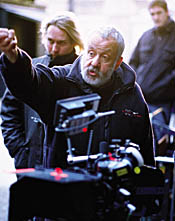|
|
 |
| |
|

Film maker Mike Leigh will talk
about Jewish themes for the first time

Eric Hobsbawn
|
Book festival open to all
It's Jewish Book Week and with over 50 events and a host of top names there's bound to be something for everyone, writes Dan Carrier
THE biggest annual book festival in London kicks off this month
and features some of the leading thinkers in British letters.
The Jewish Book Week, held at the Royal National Hotel in Bloomsbury,
features over 50 events and includes such names as historians
Eric Hobsbawm and Antony Beevor, film maker Mike Leigh, writers
David Grossman and Jonathan Freedland and a discussion chaired
by leading QC Baroness Helena Kennedy.
Although primarily featuring events based on Jewish themes,
its wide boundaries mean it is a secular occasion. According
to Gail Sandler, the chairwoman of the festival council who
lives in Swiss Cottage, the aim is to produce thought-provoking
events.
It is now the country’s longest-running book festival and
springs from a post-war wish to galvanise Anglo-Jewish culture.
The Jewish Book Council was formed in 1947 by a barrister called
George Webber. He was born and grew up in Manchester but moved
to north London to study Law at The University College London.
His daughter Marilyn Lehrer is still a regular visitor.
“He felt strongly that people simply did not read enough
books,” she says.
“After the war there was little happening in terms of cultural
events on the Anglo-Jewish scene. They were hard times, and
rationing included paper. British Jewry was coming to terms
with what had happened in Europe.
“Week after week there were notices in the Jewish chronicle
with people looking for information about their relatives. My
father wanted to do something to raise their spirits, and there
was not a book event.”
This prompted Mr Webber to form the Jewish Book Council. In
1952, the council decided the next step was to establish a festival.
The beginnings were humble: lectures were held in a small room
in Woburn House, Bloomsbury. Sellers were invited to take stalls
around the edge of the room while talks were being held.
Mrs Lehrer recalls: “It was not a big venue but it was
enough in the early years.”
Mr Webber chaired the council and then became president up to
his death in 1982.
His daughter says her father’s vision was to create an
umbrella under which all strands of Anglo-Jewry could meet to
discuss art and culture.
She added: “My father was very traditional but the festival
was open to every body – Orthodox, Reform, Liberal, Progressive
and every one in the middle.
“I do not think this is something that could happen so
easily today. My father was adamant everyone should participate
– but today I think views are more polarised.”
And Mrs Lehrer said the contributors had changed over the years
– partly because of the move from Woburn House into the
larger Royal National Hotel.
She said: “The parameters have become much wider. With
more space, the scope had broadened – there are the more
academic events and then popular speakers – and it is therefore
more accessible and is attracting a wider audience.”
Mrs Lehrer said she was particularly looking forward to listening
to a reading by Belsize Park-based actor Oliver Meek of Zvi
Jagendorf’s Strudelbakers, a book about a family from Swiss
Cottage in the immediate post-war period and how they assimilated.
Mrs Lehrer says: “I grew up in the area and I went to South
Hampstead School. I remember the many refugee families in the
area and this book covers the period well.
Chairwoman Gail Sandler joined the festival’s council two
years ago.
Mrs Sandler says the challenge the organisers face each year
is to make sure the remit is wide enough to allow people of
differing interests to feel the book week is aimed at them.
“My qualification for my involvement is I am a book lover,”
she says.
“I am looking forward to hearing Eric Hobsbawn, and David
Grossman will also be a draw – he is great with a non-Jewish
audience.”
She believes the growth of the festival is down to a general
improvement in literary festivals across the country.
She said: “People have become more interested generally
in these types of events. Literary festivals are extremely popular.
We try to give it a twist and we are trying to attract people
who are secular. We want a pluralistic audience.”
For Mrs Sandler, the boards problem is often not what to put
in – but what to leave out.
“There are so many interesting topics for us to explore,”
she says.
“It means we have to carefully put together the programme
and judging by its strength I feel we have achieved what we
set out to do.”
Festival highlights
Highlights of week include actor Henry Goodman reading from
Israel Zangwill’s Children of the Ghetto.
Zangwill grew up in the East End during the latter part of the
19th century and his fictional depictions based on his early
childhood have become a classic.
Film director Mike Leigh, whose recent play Two Thousand Years
caused a stir when it was performed at the Royal National Theatre,
will be speaking with journalist Mark Lawson.
Leigh has not worked on Jewish themes before – his family
name was Lieberman but was anglicised before his birth. The
play focussed on a secular Jewish family and is the first time
Leigh has talked about Jewish themes.
Anthony Beevor will be discussing the writer Vasily Grossman,
whose wartime notes and journalism thrilled the historian while
he was researching his bestseller on the siege of Stalingrad.
And the former Archbishop of Canterbury Lord Carey of Clifton
will be discussing the relationship between Christianity and
Judaism with Rabbi David Rosen, who has founded the discussion
group the Interfaith Forum.
|
|
 |
|


